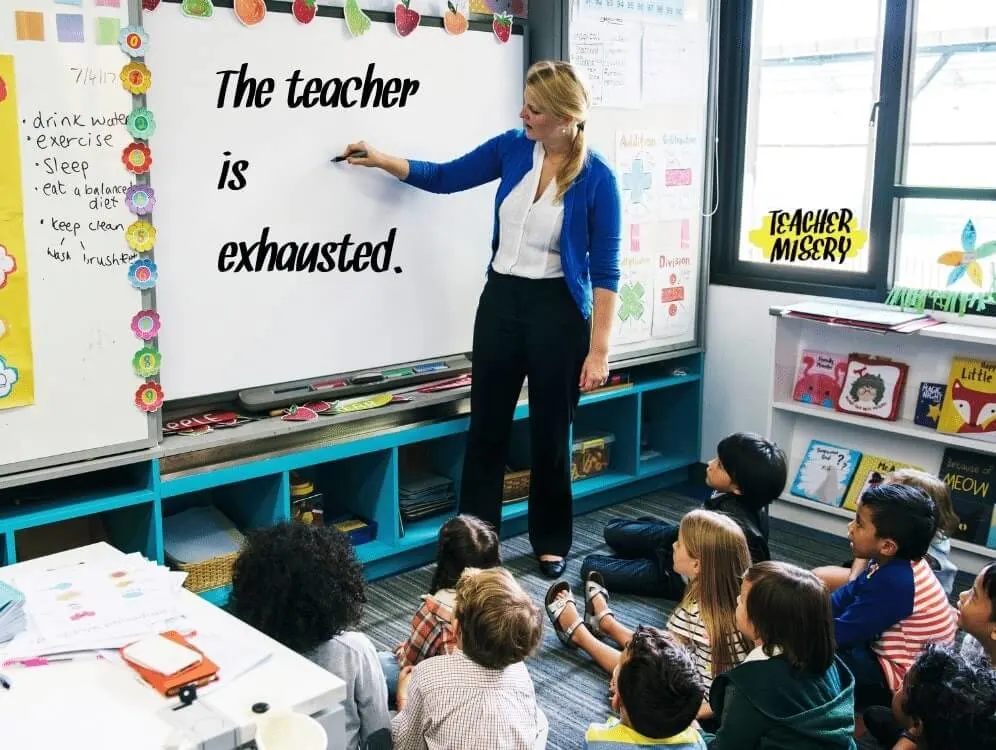Welcome! I suspect that if you’ve arrived here looking for reasons to quit teaching, you already found a few of your own.
Making the call on when it’s time to quit teaching is no easy feat. There’s a lot of fear that hangs over our heads about what we’ll do after quitting and to where we can transpose our skills. But then there’s also the emotional aspect.
Unfortunately, teaching is the kind of job that tends to pile on the guilt. Especially so when you consider leaving teaching or simply can’t do it anymore.
I’m going to stand firm in this post and call that notion out: it’s crap. It’s a job like any other, and you SHOULD leave it when you’re ready. Don’t let anyone bully you into staying in a career you don’t want.
If you’re reading about all the reasons to leave teaching to find validation in your decision, that’s already a sign that teaching just isn’t for you anymore. But alongside all the reasons, I’ve also got lots of other tips in this post too. We’re going to explore why so many teachers do quit, and also what to do after you’re out the door.
So even if you aren’t a teacher but you want to know why teachers are quitting in record numbers, keep reading! It’s about to get juicy, sarcastic…
And just a little bit miserable.

Why Are Teachers Leaving the Profession?
Our public school system is failing and teachers are leaving the profession in unprecedented numbers. Many teachers feel they have no choice but to leave a job they fiercely love in order to preserve their mental and physical health.
Teachers and school staff members from different parts of the country (and other parts of the world as well), who teach all ages and ability levels are leaving for distinct reasons. Furthermore, we’re seeing fewer and fewer new teachers show up for the punishment.
Sometimes the reasons teachers leave are obvious, such as poor salaries, high workload, and overwhelming stress. But more often the reasons why teachers are quitting in record numbers are about more nefarious things, like:

- Personal safety
- Workplace bullying
- An inability to keep others safe
- No accountability for bad student behavior
- And being undermined and devalued by parents and politicians at every turn (did someone say “book banning“?)
Make no mistake, the teacher shortage is dire. There is currently a shortage of 300,000 teachers and school staff in the U.S. Moreover, 136,000 teachers currently in the school system are not qualified to teach but were hired out of desperation.
The number of students enrolled in teacher preparation programs has plummeted over the last decade. The United Nations estimates a global teacher shortage of almost 70 million teachers by 2030.
Unfortunately, the shortages are the worst in high-poverty communities and subject areas like foreign language, science, and special education. The violent and destructive behavior of children is increasing at an alarming rate too, such as a teacher being shot by her 6-year-old student and two teens who murdered their teacher over grades.
So yeah, there are a lot of very valid reasons why teachers are quitting.
Support Teachers so They Can Support Students
School shootings are at an all-time high for the second year in a row, mainly by males ages 12-18. Classroom teachers identified clear warning signs that would have helped prevent many of our history’s most deadly school shootings. They begged the community for help.
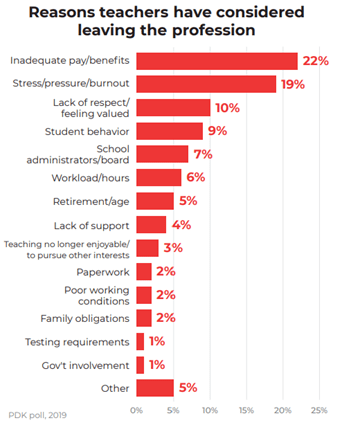
Teacher censorship and book bannings have put unnecessary pressure on teachers nationwide. Since the 2020-2021 school year, 183 educational bills have been introduced in 40 states intending to restrict teaching specific topics in K-12 schools and higher education. Of those 183, 19 of them have already become law in 15 states, which affects 122 million people.
The vague language used in these bills can be used in random scenarios to target teachers such as Katie Rinderle, a 5th-grade teacher who was fired for reading a book about acceptance to her class. Or Melissa Tempel, a 1st-grade teacher who was fired for having her students sing the Dolly Parton song called “Rainbowland”.
So basically, in a system that already has a critical shortage of teachers, laws are being introduced that stifle their ability to teach and lead to others being fired for non-issues and political point scoring. Teachers are in the firing line for parenting other people’s children while being underpaid for it. And speaking of firing lines…
If they go to work, there’s a halfway-decent chance they’ll get quite literally shot.
The only thing that is going to redirect this slow race to the bottom is greater support. For cohesion to be built between the schools and the communities and for genuine systemic change to be implemented rather than using schools as the political playground.
And since that’s never going to happen… you probably should just quit! :D
Get the Books That Started It All
Before the blog, the podcast, the merch store… there were the best-selling books.
If you like the content on this site, then you’ll LOVE the Teacher Misery books. They’re jam-packed with teaching insanity, ridiculous true stories, and all the commiseration about the profession you’ve come to know, adore, and respect.
Follow the links below to get your copies today!
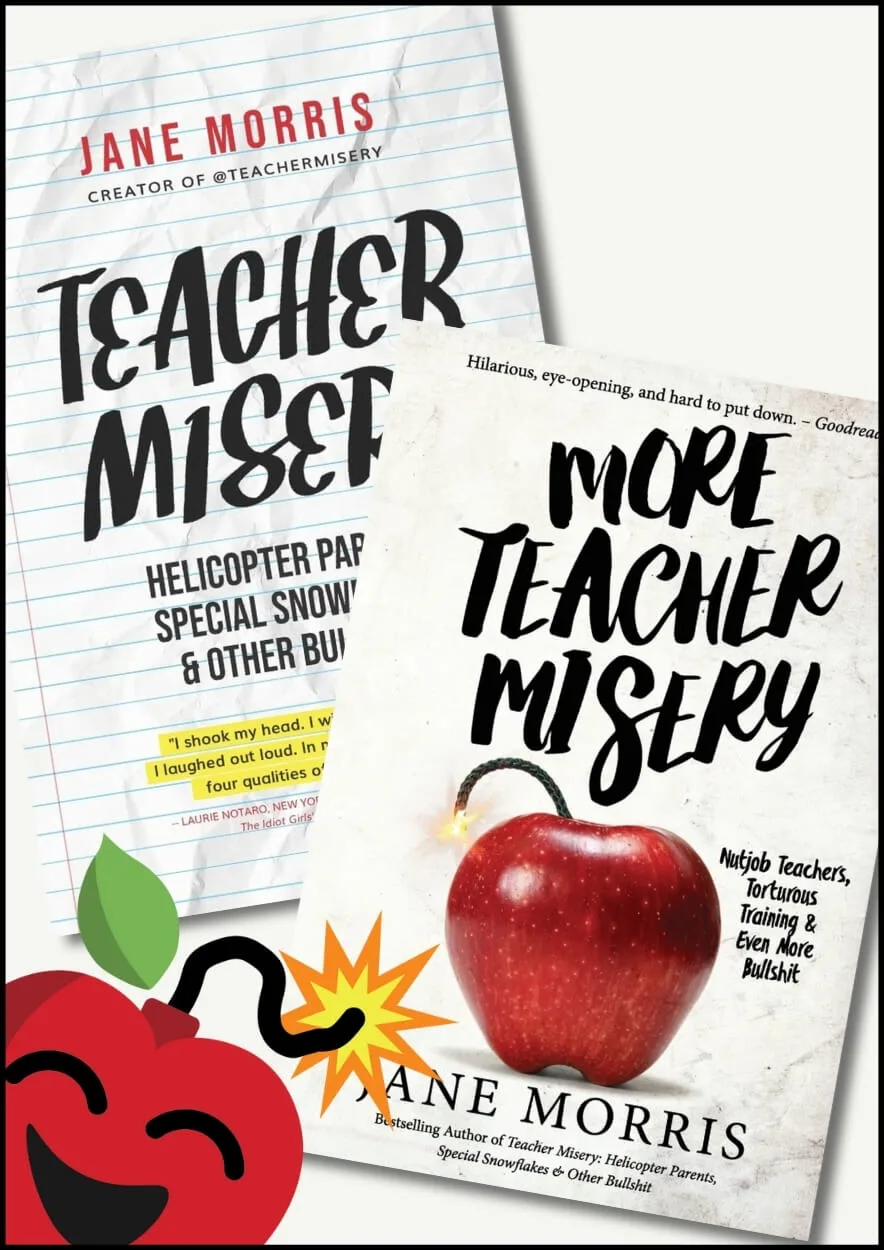
Why I Quit Teaching
I never thought I would quit my teaching job. I was definitely in it for the long haul. But reality has a way of catching up with you. Eventually, I did quit teaching.
I taught for ten years at a school that allowed for creativity and teacher discretion. The school was also so massive that it made micromanaging almost impossible. As long as you were doing your job and the parents weren’t complaining, you were left alone to teach as you saw fit.
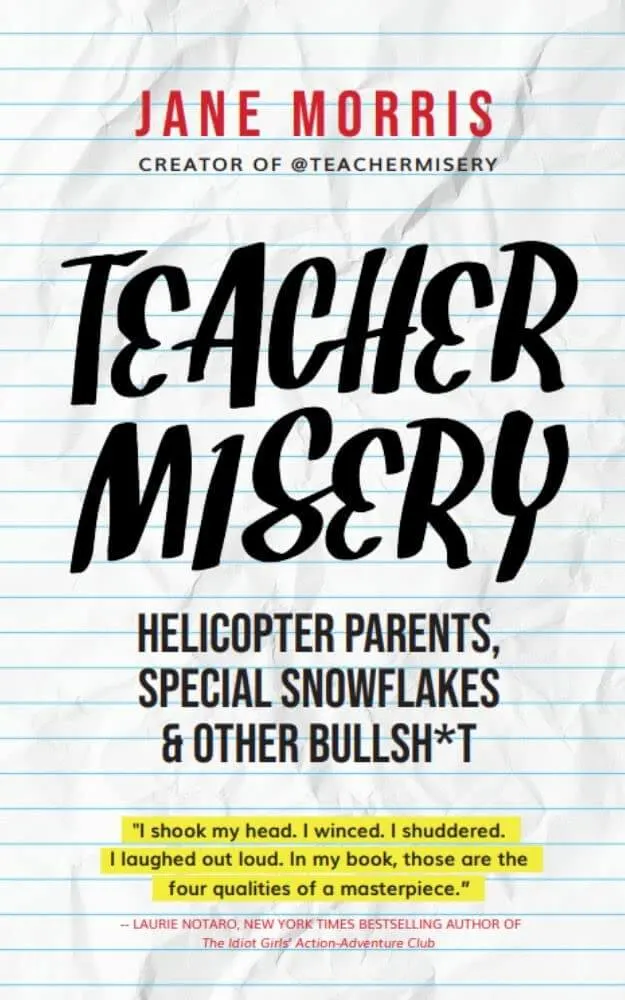
That doesn’t mean I didn’t have challenges. If you read my first book, Teacher Misery, the behavior of some of the kids (and parents) was outrageous. It was so outrageous that although I hadn’t considered quitting yet, the seeds were planted: there was no way in hell that I could possibly do this for another two decades.
I switched to another school near my house, but the behavior of the students was so out of control that it made me physically ill. It was fistfights and chaos at every corner.
At this time, I was also teaching while pregnant and developed severe preeclampsia. My daughter was born six weeks premature. When I returned after my maternity leave, I tried so hard to make it work.
I had a fabulous co-teacher, and I was able to get my classes to a point where they could eventually cool down and get some work done. But the atmosphere of constant violence and disrespect combined with the micromanagement and awful energy of the school administration made coming to work very difficult. I had to hold myself together after a day of complete chaos to be able to be a decent parent to my 5-year-old and premature newborn.
Some days, it was just too much. I remember a particularly awful day when a group of students violently attacked a security guard, sending him to the hospital to get his head stapled back together. It was the dead of winter, and everything was gray and gloomy.

On my way home, I started crying uncontrollably and had to pull over. There was such a darkness in me that I thought was my own. I kept thinking if only I could get on the right medicine, that I’d be numb enough to this place to carry on.
I told this to my doctor. I said I wanted to die. I wasn’t going to hurt myself, but I fantasized about getting in a car accident or being diagnosed with cancer so I wouldn’t have to go to that place ever again.
My doctor diagnosed me with PTSD due to teaching and insisted that I go on leave. It’s sad that us teachers are so doggedly loyal to our values that it takes a medical professional to explain that you shouldn’t need a cocktail of numbing medications to get through a workday. And that there’s a much better solution-
Quit.
Buy Some Merch · Support the Site!
Teacher Misery is by the teachers and for the teachers. Our mission to improve the lives of teachers everywhere.
If you’d like to support the cause, buy yourself (or the burnt-out educator in your life) a gift from our merch store. And, YES, they are all as sarcastic as you’d hope. 😉
Every dollar supports the commiseration!

6 Reasons to Quit Teaching (And What to Do After)
Maybe you don’t like the person you’ve become since you first started teaching (grumpy, constantly complaining, exhausted, constantly hungry…). Don’t worry! Overwhelming stress and a complete lack of a support system will do that to a person.
Maybe you just never really feel safe when you’re at school. Constant active shooter and lockdown drills are causing you massive anxiety. Playing Batman with a room full of children when someone starts shooting bullets at the classroom door is just not in the job description!
Look, there are a lot of valid reasons to quit teaching. Heck, there are a lot of reasons to hate teaching! I could probably write a sequel to Teacher Misery filled with all the reasons to quit!
But here are my top six.
1. Teaching is Ruining Your Physical Health
Stress causes health problems. We all know this. But if your teaching job is ruining your health, you have to ask yourself if it is really worth it.
How are you feeling? Are you experiencing:
- Chronic headaches
- Stomach issues
- Physical anxiety (e.g.shortness of breath)
- Insomnia
- Muscular pain
- Skin problems (e.g. constant rashes)
And yet, magically, if these all seem to disappear in the summer or on holiday vacations, you have to ask yourself why you stay in a job that makes you suffer. Not every job causes these kinds of issues, and certainly not ones with such low pay and so little respect.

If teaching causes you any health concerns, that’s the number one reason to leave teaching. Seriously, quit your teaching job mid-year if you have to. No job is worth your life.
As one school administrator put it so kindly, “We will post your job vacancy before they post your obituary.”
2. Your Emotional Health is Suffering
The unending pressure on your mental health is one of the primary driving forces for teachers leaving the profession all over the world. And it goes hand in hand with physical health.
If you are crying all the time, avoiding doing the things you used to love on the weekend, or feeling hopeless about life, I will be the one to tell you that it is not worth it. The same goes for anxiety or the above-mentioned change in disposition to someone you don’t recognize.
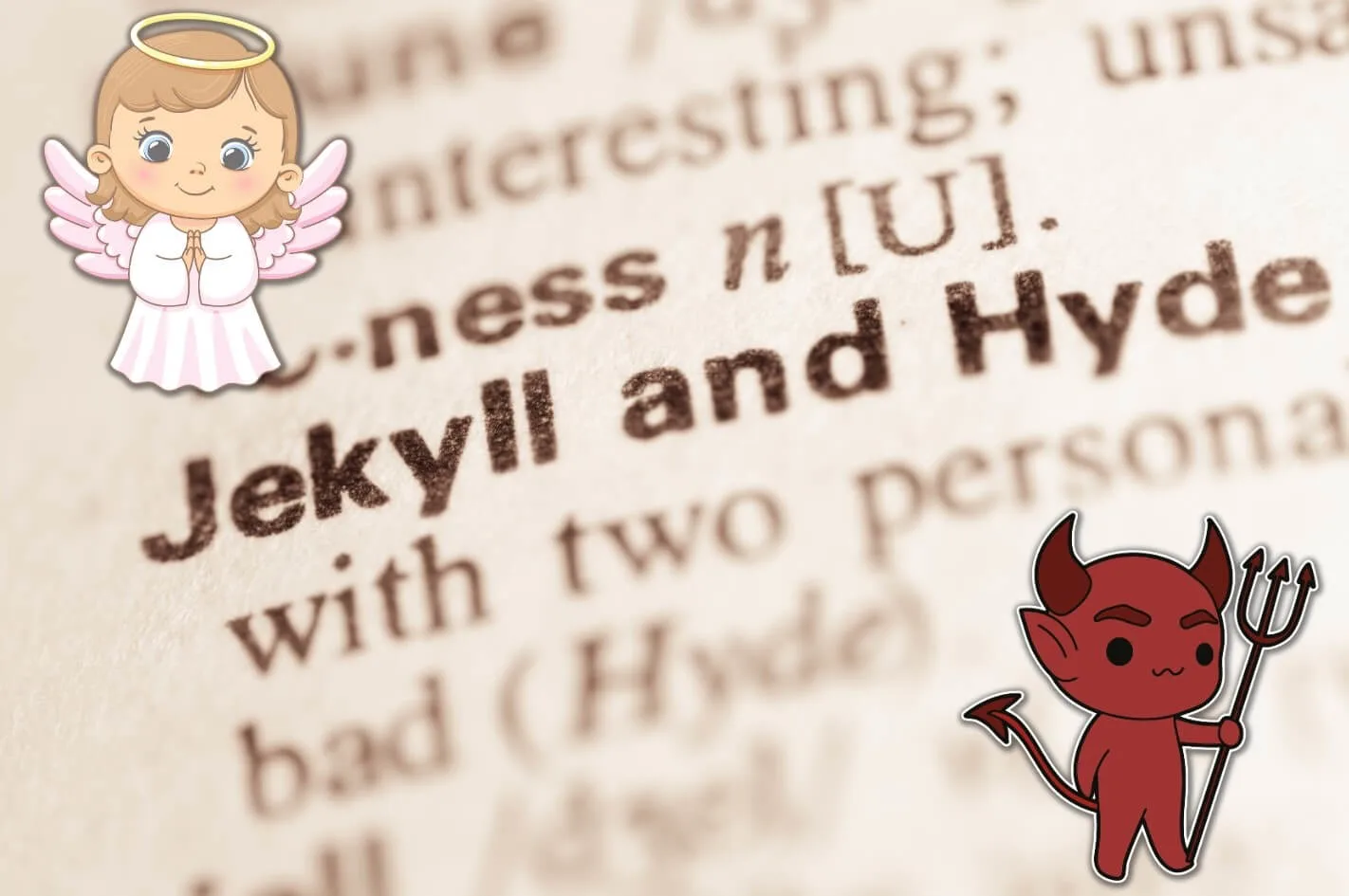
There are plenty of other jobs where you can help others, feel a sense of self-worth, be creative, and probably get paid A LOT higher salary than teachers. And they won’t make you feel like crap on a regular basis too!
Yes, work can be stressful. But no, work should not completely change you as a person for the worse. Take back your work-life balance.
3. You’re Sick of Being Poor
Your friends go on cool vacations, but you can never afford to. Truthfully, you can barely pay your bills.
Teacher salaries, though varying by state, are pretty much trash across the board. You might have considered becoming an administrator in your school district just so you can make more money, even though you just want to teach. But even that is only going to help so much.

The money is never going to significantly improve. So unless you can get comfortable living the way you are living now, you should consider finding a job that will pay you what you’re worth.
You work very hard, have several degrees, and are extremely capable. You deserve not to have to constantly worry about money. And to pay off those student loans too!
4. It’s Not What It Used to Be
Unless you’re in the first five years or so of teaching, you’ll probably agree that it’s not what it used to be. Or what you expected.

Teaching has dramatically changed in the last decade, and exponentially so since 2020. Your experience of school as a student is not at all what the classroom is now like.
- Kids have more emotional issues and learning disabilities than ever.
- Parents are more demanding and less supportive than ever.
- And administration never stops adding unrealistic expectations onto your shoulders.
If you didn’t think it would be this way just a few years ago, you were right. But this is the teaching experience now, and it’s only going to get harder.
5. You Have Your Own Family Now
When I first started teaching, I was in my early twenties, My only real responsibility was paying rent and taking care of my new puppy. The salary I was receiving for teaching at the time was incredible.
I had never had that much money in my life, having only subbed here and there and worked part-time at Starbucks. During this time, I was actually able to take small vacations and grow a savings account. I also had the luxury of coming home and collapsing on the couch and really only getting up to eat a frozen pizza or go to bed.

I now have two young children, and the increase in pay over the years doesn’t come anywhere near close to what I need to raise them properly. Daycare/preschool alone is more than a whole paycheck. I actually know some teachers who decide to stay home with their young children merely because it would cost more to send them to daycare!
I also can’t come home and veg out anymore. The gremlins need feeding before midnight, and don’t even get me started on bath time!
Managing teaching and parenting responsibilities is hard. I don’t want to constantly snap at my kids for small things simply because I have no patience left after dealing with hundreds of other people’s kids all day. That’s not fair to them.
Now that I’ve quit teaching, I have so much more energy to do things with them on the weekend. We do activities instead, and it’s a happier life overall. A better work-life balance leads to a better home life.
I decided to put my own kids first before everyone else’s.
6. Micromanaging
I know for me, one of the best parts of being a teacher was using my own creativity to create lessons. The more classroom activity was micromanaged, and the more I felt I was being “watched”, the more it felt like a prison. If you can’t create lessons you know will engage your students, and you have to just “implement” a curriculum that was handed to you, that robs you of one of the best parts of teaching.

At the county I worked for, they called the assignments that all the kids had to do “Common Tasks”. I started to call myself the Task Master because I felt like I was forcing kids to do things that weren’t always realistic for them.
How can I push the importance of doing something when I don’t even believe in it? These days, it’s all about “improving student outcomes” and not “improving student experiences and enriching their lives”.
This is a major reason why good teachers quit. Not to mention being directly micromanaged by the administration.
Feeling paranoid because administrators were constantly coming into my classroom and overseeing what I was doing was another reason why I quit teaching. I am great at what I do: there were no student or parent complaints. But some school administrators feel the need to look like they actually do something and hover just for a sense of control.
I can’t work like that. If they’re so good at teaching, then maybe they should just do it themselves.
What to DO After You Quit
Look, you have options after you’ve taken the plunge, written that resignation letter, and left teaching behind.
Please, do not think that you’re pigeonholed by the career you’ve chosen so far. I promise you that all those skills are transferrable and a good life beyond teaching awaits.
As evidence of that is the Teacher Career Coach Course! Daphne Gomez, former teacher extraordinaire, has built an entire business and career around helping other teachers leave their careers.
Her course is a step-by-step process to help you do just that. Throughout the course, you’ll be supported with a collection of awesome resources and assistance for kicking off your next season in life with 100% success.
Things like:
- Determining what jobs are right for you
- Networking
- Resume writing
- Interview coaching
- And even access to a community of current and former teachers for encouragement and support
If you’re seriously contemplating leaving the teaching profession, there’s no better backup you need than the Teacher Career Coach Course. Just check it out and I’m sure you’ll see what I mean. :)
Internal Signs That Teaching is Not For You
That was the reasons for quitting teaching, but what about all the warning bells inside you? Similar to the symptoms of teacher burnout, they tell you something isn’t working.
Listen to your gut. It’s one of the few friends you have out there in the school system.
If this post or any of these signs are even marginally resonating with you, follow that train of thought and see where it leads.
You Quit Teaching… Now What?
First and foremost, you will be okay.
School culture is so insulated it can make you feel like you’re making a huge mistake to leave. Or that you’re letting everyone down.
It’s time to put yourself first. You did your duty to humanity and raised the children of others, and now it’s your time in the sun.
Make no mistake, if you were at all successful at teaching (you survived a few years at least!), you have the skills to excel at pretty much anything you decide to do. No one multitasks like teachers and no one has the insane work ethic we have! You’ve got this.

If you want help exiting the career, resources like the Teacher Career Coach Course are your best friend.
And if you just need a place to vent and air your grievances, there’s a place on Teacher Misery for that too!
For most teachers, the teaching profession is in our blood. It’s who we’ve always been, who we’ve always wanted to be. It’s who we are, regardless of our job titles.
I now know that I can be a teacher in many other ways and still feel fulfilled. I am teaching my own children every day. I teach others how to be kind by treating them with kindness. And I teach the world how sick our schools are by sharing our truths every day on social media.
As a result, I am healthier and happier than I have been in 17 years. If this post resonated with you even 10%, I would seriously advise examining all your reasons for quitting teaching and taking the leap.
No matter what, I promise you that there is a good life beyond teaching waiting. When I surveyed other ex-teachers about what they do now, the diversity was simply staggering! And better paid too. (And also still rewarding.)
Here are the most common responses I received about the jobs former teachers worked:
- Selling curriculum materials online
- Selling things they make or reselling other goods online (consider Etsy, eBay, etc.)
- Creating a curriculum for a textbook company
- Working as an educational consultant (I’m sure this is something obnoxious, but hey, it pays a lot more than teaching!)
- Standardized test writer
- Working in Human Resources
- Academic advisor for a university
- Professional tutoring
- Academic coach
- Or just work at a store they like!
Don’t waste your one life doing something that makes you unhappy and unhealthy, especially not because you’re scared. And definitely not because you’re “loyal”.
One of the best pieces of advice I ever heard was to “Put yourself at the top of your list because no one else is putting you at the top of theirs.” Nothing could be more true.
The administrators aren’t. The government isn’t. The school system sure ain’t. The only one who is going to prioritize you is YOU.
If leaving teaching is the right call, then leave and never look back. It will be one of the best decisions you ever make.
And if the whole school system crumbles nationwide due to the crippling attrition of even average-level teachers, then who cares? Maybe they’ll be the ones to learn their lesson next!
How delightfully poetic.


